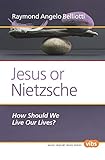Jesus or Nietzsche : how should we live our lives? / Raymond Angelo Belliotti.
Material type: TextSeries: Value inquiry book series ; v. 529. | Value inquiry book series. Ethical theory and practice.Publication details: Amsterdam : Editions Rodopi, 2013.Description: 1 online resource (246 pages)Content type:
TextSeries: Value inquiry book series ; v. 529. | Value inquiry book series. Ethical theory and practice.Publication details: Amsterdam : Editions Rodopi, 2013.Description: 1 online resource (246 pages)Content type: - 9401209251
- 9789401209250
- 193 23
- B3317 .B45 2013
- online - EBSCO
| Item type | Current library | Call number | URL | Status | Notes | Barcode | |
|---|---|---|---|---|---|---|---|
 eBook
eBook
|
Biblioteca "Angelicum" Pont. Univ. S.Tommaso d'Aquino Nuvola online | online - EBSCO (Browse shelf(Opens below)) | Online access | Not for loan (Accesso limitato) | Accesso per gli utenti autorizzati / Access for authorized users | (ebsco)578911 |
Includes bibliographical references and index.
Print version record.
This book reconstructs the cornerstones of Jesus's moral teachings about how to lead a good, even exemplary, human life. It does so in a way that is compatible with the most prominent, competing versions of the historical Jesus. The work also contrast Jesus' understanding of the best way to lead our lives with that of Friedrich Nietzsche. Both Jesus and Nietzsche were self-consciously moral revolutionaries. Jesus refashioned the imperatives of Jewish law to conform to what he was firmly convinced was the divine will. Nietzsche aspired to transvalue the dominant values of his time -which themse.
EDITORIAL FOREWORD BY OLLI LOUKOLA; PREFACE; ACKNOWLEDGMENTS; LIST OF ABBREVIATIONS; INTRODUCTION; 1. Introduction; 2. Nietzsche's Life; 3. Problems of Interpretation in Nietzsche; 4. My (Mis)Interpretation of Nietzsche; ONE Jesus: The Nature of Our World and Our Mission in It; 1. Family Relations; 2. Associating and Identifying with Undesirables; 3. Unsettling Established Rituals; 4. Interrogating Prevailing Norms of Just Distribution; 5. Material Minimalism; 6. Jesus and the Concept of Forgiveness; TWO Nietzsche: The Nature of Our World and Our Mission in It; 1. Perspectivism.
2. Genealogical Critiques3. Crafting a Worthy Self; 4. Values; 5. Nietzsche's Glad Tidings; 6. Master and Slave Moralities; 7. Going Beyond Good and Evil; 8. Eternal Recurrence; 9. Philosophy and Psychology; 10. Style and Rhetoric; 11. Tragic View of Life; 12. Jesus and Nietzsche; THREE Fundamental Understandings of Human Beings: Unconditional Love and the Will to Power; 1. The Power of Unconditional Love; 2. The Paradoxes of Agapic Love; 3. Parental Agape; 4. The Will to Power; 5. The Last Man and The Overman; 6. Nietzsche on Jesus; 7. Nietzsche on St. Paul and Christianity.
8. Nietzsche's Understanding of Jesus9. Jesus and Engagement in this World; 10. Daunting Normative Ideals; FOUR The Perfectionism of Jesus; 1. Perfectionism and Unconditional Love; 2. Extending Unconditional Love; 3. Unconditional Love and Abstraction; 4. A Summary of the Perfectionism of Jesus; 5. The Ethic of Jesus and Contemporary Philosophy; 6. Jesus' Enduring Message; FIVE The Perfectionism of Nietzsche; 1. Nietzsche's Vision; 2. Aristocratic Privilege; 3. A Summary of the Perfectionism of Nietzsche; 4. The Perfectionism of Nietzsche and Contemporary Philosophy.
5. Jesus and Nietzsche: Toward a SynthesisNOTES; BIBLIOGRAPHY; INDEX; ABOUT THE AUTHOR.


